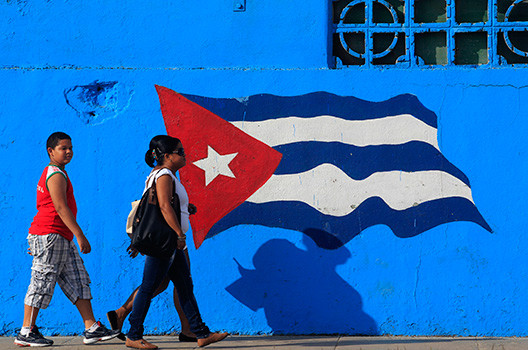
Quick Takes from Atlantic Council Experts
President Barack Obama today announced a historic policy change that opens up diplomatic relations, facilitates trade, and expands travel to Cuba.
Immediately after the White House announcement, Atlantic Council experts provided the following analysis.
More on us-cuba policy |
Atlantic Council CEO and President Fred Kempe:
“President Barack Obama’s executive order today dramatically alters Cuba policy in a manner likely to advance individual freedom and democratic change. In taking steps to pursue direct engagement with a country just ninty miles off our coast, the president’s actions will open access to information, increase exchanges, boost private enterprise, and accelerate democracy. Once walls are torn down – like with the fall of the Berlin Wall and the collapse of the Soviet Union – the truth becomes hard to hide. The beginning of the end of the island’s authoritarian legacy will come because Cubans will now more easily see what is beyond their shores.
Our poll on U.S. Cuba relations, issued earlier this year, underscored why the majority of Americans of all ilk are ready for change. Our national poll found that domestically the president has support from Americans on both sides of the aisle for normalizing relations. It also found that the strongest proponents of this move are voters in Florida, historically those most invested in Cuba policy and the status quo.
We all want a peaceful, prosperous and democratic Cuba. The only difference is how to get there. Fifty-five years resulted in very little change in Cuba — the policy wasn’t working. Now is time to try engagement. The resulting avalanche of visitors, social media, internet sites and family investors in Cuban enterprises will make it increasingly difficult for the Cuban government to hold back the desire of everyday Cubans to be free.”
Peter Schechter, director of the Atlantic Council’s Adrienne Arsht Latin America Center:
“In the last month, President Barack Obama has used executive orders to address the two largest structural impediments to better US relations with Latin America; immigration, and Cuba. We commend his leadership on both counts. Today, nearly fifty-five years of ineffective Cuba sanctions policy has come to an end.
Even our closest Latin allies repeatedly advised us to ‘fix’ our Cuba policy; the Cuba embargo placed a boulder-sized pebble in the shoe of US-Latin American relations. It is a relief to have it removed, to walk comfortably together towards a more fully democratic region.
The ever-smaller, yet still noisy, pro-embargo crowd in this country will surely kick and scream over these changes, accusing the president of ‘giving in’ to the Castros. They are wrong. With the US sanctions out of the way, the conversation can turn away from US sanctions policy to fully focus on a half century of dictatorship and repression. The international community — which normalized relations with Cuba long ago — can now openly encourage a democratic Cuba. And isn’t that the whole point?
America was long ready for this change. The Atlantic Council’s poll released in earlier this year found that domestically the president has support from Americans on both sides of the aisle for normalizing relations and removing Cuba from the terrorism list. It also found that the strongest proponents of this move are voters in Florida, historically those most invested in Cuba policy.”
Jason Marczak, deputy director of the Atlantic Council’s Adrienne Arsht Latin America Center:
“The actions taken by President Obama today are the effective end of a policy that for nearly fifty-five years has failed to produce real, democratic change in Cuba. The embargo now exists in name only.
The freeing of Alan Gross and an unnamed US intelligence asset has opened the door for relaxing restrictions on banking, remittances, and travel. This, along with the restoration of diplomatic relations, will move Cuba further down the path of reform. After the review process, Cuba should be expected to be removed from the State Sponsor of Terrorism list, which will open the island to the reform pressures that come with the access this brings to international financial institutions. Engagement is what brings about change and will eventually allow Cubans to one day live in a free society.
The president’s executive orders will reverberate far beyond the 11 million Cubans living on the island. Our influence in the hemisphere and beyond will only be strengthened through a policy change that focuses on engagement.
The US embargo has been the rallying cry for those in Latin America and across the world who scream of hypocrisy. The US deals with rogue nations around the world as we have consistently found that engagement, not isolation, leads to productive dialogue. Cuba is not viewed as rogue by many of our allies. Indeed, it is hosting peace talks to end the fifty-year guerrilla war in Colombia with the FARC, and is engaged in trade discussions with the European Union. This is not a democratic society but today puts new pressures on a crumbling regime that can no longer count on the support of its main benefactor, Venezuela. Today, the Cuban people are one step closer to freedom.”
